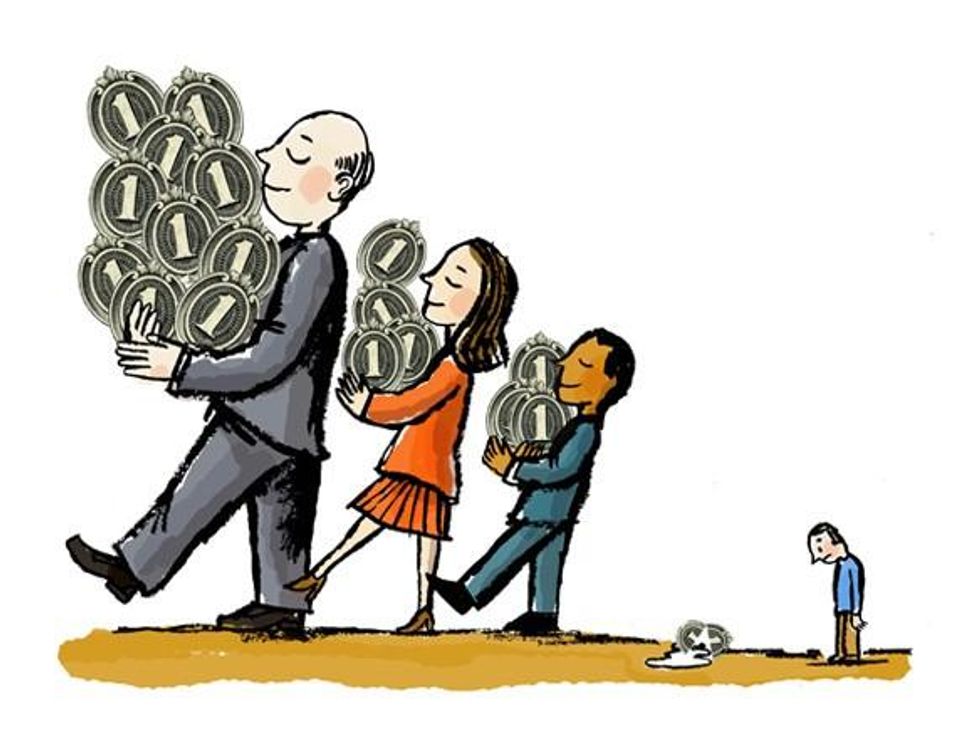The United States is, by every reasonable measure, the most unequal of the world's rich countries. And this is not new development. For more than three decades, the US has been suffering from a crisis of inequality. The Democrats have not taken this crisis seriously enough. The Republicans seem hell-bent on making it worse.
Evidence of extreme and rising economic inequality in the US is quite overwhelming. In 1979, the top 1% earned about 9% of all income; in 2013, they earned 24%. The incomes of the top 0.1% have grown even faster. More than half of all economic growth since 1976 has ended up in the pockets of the top 1%. Meanwhile, the incomes of the shrinking middle class have stagnated, and the incomes of those with a high school education or less have fallen substantially. The purchasing power of the minimum wage has fallen by about 15% since 1979. One in five kids lives in poverty.
How have we responded to all of this? By cutting taxes for the rich, busting unions and vilifying the poor! Over the past few decades, effective tax rates on US corporations and the richest 1% have fallen by about a third. Among the world's rich countries, US tax rates on the rich are near the very bottom. Since 1970, the percentage of private sector workers in unions has fallen from 29% to 7%.
It has not always been this way. Between 1948 and 1975, the income of the median US household doubled. The incomes of the bottom 20% actually grew a little faster than the incomes of the top 20% over this period. Between 1928 and 1950, the distribution of income in the US actually became dramatically more equal.
Why should we be concerned about inequality? America is about opportunity, not guarantees -- right? Actually, no! Among the world's rich countries, the US is tied for last in class mobility; an American's economic success is in fact highly correlated with his/her parents' wealth and status. Richard Wilkinson captures this sad reality perfectly: "If you want the American Dream, you'll have to go to Denmark."
Economic inequality inevitably means political inequality. The right-wing Koch brothers, for example, spent more than $50 million aiming to defeat Obama and the Democrats in 2012. Right-wing casino magnate Sheldon Adelson spent over $100 million. Increasingly, legislation is literally being written by corporate lobbyists. The Koch brothers are entitled to their right wing views; they should not be entitled to the kind of outsized influence that $50 million will buy.
There is also compelling evidence that inequality is socially corrosive. In their magnificent book, The Spirit Level, Richard Wilkinson and Kate Pickett show that unequal societies suffer from higher rates of violent crime, incarceration, obesity, infant mortality, mental illness and alcoholism. Inequality is also associated with lower life expectancy, lower levels of educational performance and lower levels of trust. Inequality is bad for all of us.
Those are the facts.
In this context, the Republican Party's economic proposals are especially appalling. The Republican vision - embodied in the "Ryan Plan," a budget proposal supported by virtually every Republican legislator -- calls for still deeper cuts in taxes for corporations and the top 1%, and further reductions in the "regulatory burden" on oil, coal and gas companies (including "frackers") and - believe it or not -- Wall Street! And further still, Republicans advocate deep cuts in spending on education, Head Start, environmental protection, Social Security, Medicare and Medicaid. Remarkably, the Republicans have concluded - yet again! -- that the super-rich are getting too little, while children, the elderly, the middle class and the poor are getting too much!
Sound familiar? After thirty years, it should. This is trickle-down economics.* The "logic" here (and I'm being generous) is that the economy will grow if we provide a better "business climate" -- lower taxes and fewer regulations will liberate corporations to create jobs. The problem is that it doesn't work. Three decades of lower taxes and reckless deregulation have saddled us with slow growth, soaring inequality, the financial meltdown of 2008, a devastating recession, rising tuition at our public universities, and diminishing opportunities for millions of Americans. And yet -- like a zombie that will not die - trickle-down economics is alive and well in the US, despite its long record of failure.** Ask any Republican about the economy, and he (or she) will tell you that we need more of this toxic concoction.
The US remains a very rich country. It has the capacity to do much better; it has the capacity to produce equitable, sustainable growth. A detailed discussion of how this might go is more than I can do here, but this process would surely include higher taxes on the wealthy, a more serious effort to regulate the financial sector, greater corporate accountability, and increases in public investment. It would also require a shift in priorities - a political transformation. It would require a discourse and a policy agenda that prioritizes the needs of working class and poor people: affordable education and health care, enhanced worker bargaining power, and a commitment to full employment.
Along with a grim, stubborn economic crisis, we face a national identity crisis. Do we want to recognize that our well-being is tied to that of our neighbors? Do we want to prioritize shared prosperity and economic security? Do we want a country in which every kid has a chance to reach her full potential? Or do we want a country that prioritizes the "right" of rich people to get richer?

